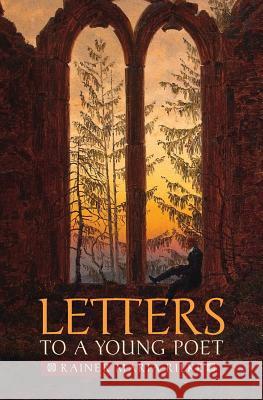Letters to a Young Poet » książka
Letters to a Young Poet
ISBN-13: 9781621380986 / Angielski / Miękka / 2014 / 84 str.
Letters to a Young Poet
ISBN-13: 9781621380986 / Angielski / Miękka / 2014 / 84 str.
(netto: 32,32 VAT: 5%)
Najniższa cena z 30 dni: 33,38
ok. 16-18 dni roboczych.
Darmowa dostawa od 40 zł!
While a student, Franz Kappus began sending his poetry to a young Rainer Maria Rilke, seeking his advice. The resultant ten letters from Rilke, published after his death, contain words of luminous intimacy where Rilke shapes the ecstasy of youthful desire into a consideration of how to live life deliberately.
Becoming an artist is an apprenticeship in solitude, seeking, and suffering. When initially asked by Herr Kappus whether his verses are good, Rilke counters with the dismissal of all such outward concerns, and an admonition to go inside oneself, to discover whether one's poetic motives reach to the hidden recesses of the heart. For the artist is on his own, alone, centered in his innermost depths. Rilke next speaks of surrounding oneself with books, in which one may enter worlds of inconceivable greatness. In a subsequent letter he writes of the artist's vocation as one of growing into the spirit of childhood, where everything that happens is forever a beginning. And he writes of moments of sorrow as a new thing entering us; and, unnoticed, becoming a part of our very life-blood.
For Rilke, art is a way of living: becoming a poet or an artist is not so much about learning one's craft as about becoming a certain kind of person. Act is preceded by being, so that an unrestrained devotion to the creative process must proceed from the nurturing of patience and a deepening of one's interior life. An immense inner stillness, reaching through time, rightly precedes all efforts of artistic creation. Developing as an artist is not measured by time or any external markers: "Being an artist means, not reckoning and counting, but ripening like the tree, which does not force its sap, and stands confident in the storms of spring without the fear that after them will come no summer. It does come. But it comes only to the patient, who are there as though eternity lay before them...."
This is a book to encounter in youth and remain with into old age, a vade mecum in the school of artistic being and thoughtful living.
While a student, Franz Kappus began sending his poetry to a young Rainer Maria Rilke, seeking his advice. The resultant ten letters from Rilke, published after his death, contain words of luminous intimacy where Rilke shapes the ecstasy of youthful desire into a consideration of how to live life deliberately.Becoming an artist is an apprenticeship in solitude, seeking, and suffering. When initially asked by Herr Kappus whether his verses are good, Rilke counters with the dismissal of all such outward concerns, and an admonition to go inside oneself, to discover whether ones poetic motives reach to the hidden recesses of the heart. For the artist is on his own, alone, centered in his innermost depths. Rilke next speaks of surrounding oneself with books, in which one may enter worlds of inconceivable greatness. In a subsequent letter he writes of the artists vocation as one of growing into the spirit of childhood, where everything that happens is forever a beginning. And he writes of moments of sorrow as a new thing entering us; and, unnoticed, becoming a part of our very life-blood.For Rilke, art is a way of living: becoming a poet or an artist is not so much about learning ones craft as about becoming a certain kind of person. Act is preceded by being, so that an unrestrained devotion to the creative process must proceed from the nurturing of patience and a deepening of ones interior life. An immense inner stillness, reaching through time, rightly precedes all efforts of artistic creation. Developing as an artist is not measured by time or any external markers: "Being an artist means, not reckoning and counting, but ripening like the tree, which does not force its sap, and stands confident in the storms of spring without the fear that after them will come no summer. It does come. But it comes only to the patient, who are there as though eternity lay before them...."This is a book to encounter in youth and remain with into old age, a vade mecum in the school of artistic being and thoughtful living.











